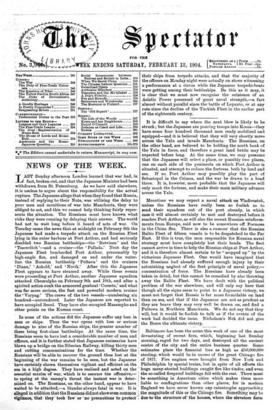NEWS OF THE WEEK.
TAST Sunday afternoon London learned that war had, in fact, broken out, and that the Japanese Minister had been withdrawn from St. Petersburg. As we have said elsewhere, it is useless to argue about the responsibility for the actual rupture. The Japanese allege that when they found that Russia, instead of replying to their Note, was utilising the delay to pour men and munitions of war into Manchuria, they were obliged to act, and this we cannot help thinking fairly repre- sents the situation. The Russians must have known what risks they Were running by delaying their answer. The world had not to wait long before it heard of acts of war. On Tuesday came the news that at midnight on February 8th the Japanese had made a torpedo attack on the Russian Fleet lying in the outer harbour at Port Arthur, and had seriously disabled two Russian battleships—the Retvisan ' and the
Tsarevitch '—and a cruiser—the Pallada.' Next day the Japanese Fleet bombarded Port Arthur, presumably by high-angle fire, and damaged on and under the water- line the Russian battleship Poltava' and the cruisers 'Diana,' Askold,' and Novik.' After this the Japanese Fleet appears to have steamed away. While these events were proceeding at Port Arthur, another Japanese squadron attacked Chemulpho on February 9th and 10th, and after a spirited action sunk the armoured gunboat 'Coreetz,' and what was far more serious, the fast and powerful modern cruiser the ' Varyag.' The crews of the two vessels—numbering six hundred—surrendered. Later the Japanese are reported to have occupied Seoul. They have also occupied Masampho and other points on the Korean coast.






































